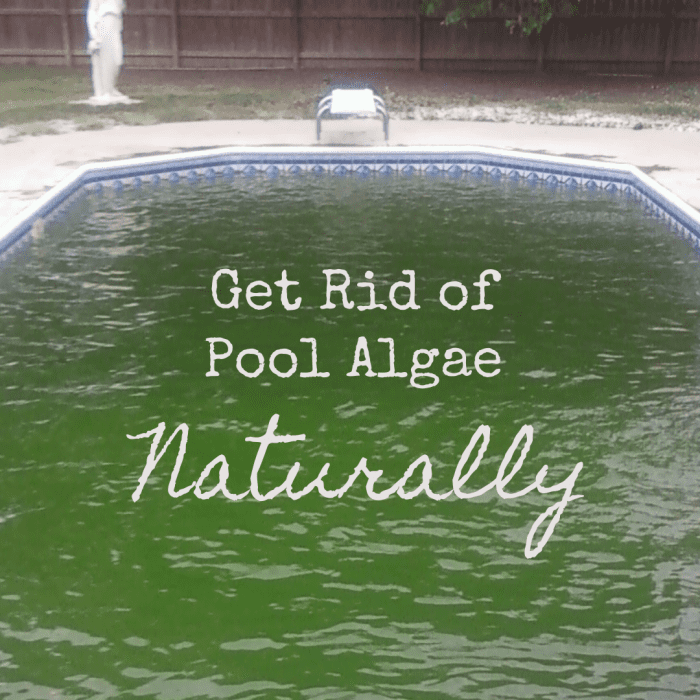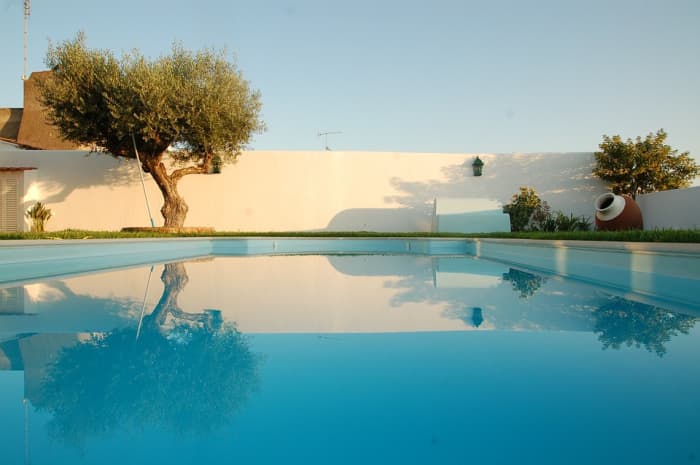How to Get Rid of Tadpoles in My Pool
I have a beautiful swimming pool at home that I've maintained and kept clean for my family and our many guests.

You don't need harsh chemicals to treat the algae in your pool.
By Bigroger27509
Help! My Pool Is Green!
It's a hot summer day and the sun is bright—perfect weather for taking a dip in your pool. You venture out to the backyard to check out the pool you haven't used since last summer. Lo and behold, it's green!
You take a closer look and see green, yellow, even black algae growing in your pool. You know it can't be safe to swim in that infested water—plus it's just gross and slimy. How on earth did this happen?
What Causes Algae in a Swimming Pool?
Algae are plant organisms that grow where it is warm, wet, and sunny. Of course that's a perfect description of most swimming pools in the summertime, yes?
Algae spores can drift into the pool on the wind, or people can bring spores into the pool via dirt and leaves they've come into contact with. Certain nutrients often found in pools, like phosphate, can actually help the algae grow. Phospate can enter the pool through people, dirt, leaves, and even some chemicals.
Some organisms that we call algae, such as blue-green algae, black algae, and pink algae, are actually bacteria. Either way, algae is also a breeding ground for bacteria, which means it is potentially not safe to come into contact with it.
During those hot summer months when the sun is beating down on your swimming pool, algae is given the perfect environment in which to grow. This is especially true when the pool has not been cleaned or treated.
Pool Algae Removal: Cotton Ball Method
Vacuum the Pool (for Above-Ground Pools)
If you have an above-ground pool, you probably use a vacuum to clean out all of the debris.
The problem, however, is that most of the vacuums that are made for these kinds of pools use mesh bags to pick up the debris. Much of the debris—including the algae—will slip right through the mesh and go back into the pool you are vacuuming.
So what can you do to get rid of the algae?
How to Modify the Mesh Bag to Pick Up the Algae
I've discovered two different workaround fixes for this problem. Both fixes involve modifying the mesh bag so that it collects the small debris that usually escapes it. These solutions work well with the Intex above-ground pools, for example.
- Cotton ball method: Fill the mesh bag with cotton balls and then make sure you pull the bag up to the end of the vacuum opening so that there are no loose cotton balls in the bag. Once you do this, the cotton balls will actually pick up most of the dirt, sand, and algae that otherwise would have slipped back into the pool through the mesh.
- Microfiber mitt method: Take a microfiber glove mitt (made for cleaning cars), turn it inside-out, place on the outside of the mesh bag, and secure it to the vacuum with something like a shoestring. The microfiber mitt will pick up a whole lot of that junk that the regular mesh bag misses. The mitt must be turned inside out when you put it over the mesh bag so that the algae and sand stick to it when all of that debris is sucked up through the vacuum.
Read More From Dengarden
Pool Algae Removal: Microfiber Mitt Method
Natural Home Remedies
- Salt: Many people treat their swimming pools with salt rather than chemicals like chlorine. Compared to chlorine, salt is cheaper, safer, and more natural. Salt works to break down dirt and bacteria through a process called electrolysis. You can use the salt chlorine generator to deposit salt into your pool.
- Orenda water treatment: This natural treatment removes the phosphate and other nutrients that algae feed on. Without a food supply, the algae can no longer thrive and grow. It takes very little of this treatment to get rid of phosphate and other nutrients.
- Ionic pool cleaner: This cleaner operates to release copper and silver into the water, which reduces the growth of bacteria.
- Sonic wave cleaner: This cleaner causes the cells in algae to vibrate and break down. Note: This tool should not be used exclusively but is good to use in conjunction with other strategies.
- Ultra-violet light: Many people choose to use generators that use ultra-violet light or electricity to produce ozone. The ozone sanitizes the pool through a process called oxidation.
Pool Salt Systems
Natural Cleaning Agents
- Baking soda: This is a great cleaning agent in general that also works well in swimming pools. The active ingredient in baking soda is sodium bicarbonate, which breaks up algae and allows you to scrub it and clean it from your pool. It's particularly effective in getting rid of black algae.
- Borax: This cleaning agent is a bit more controversial but is considered relatively safe. It works particularly well in getting rid of white algae. Borax is a mineral and is considered to be a mild skin irritant, although it is not carcinogenic.
Happy Swimming!
So you have a multitude of options for keeping your pool clear of algae. You can keep it clean with a vacuum, use natural cleaning materials like baking soda or borax, and you can use natural treatments like salt or other natural products that remove minerals that algae feed on.
In these ways you can keep your swimming pool clean and safe!

Naturally treated pools can be clean, beautiful, and safe.
Pixabay. Public Domain.
References
8 Ways to Green Your Pool. Retrieved 28 August 2017 from Earth911.com.
Eliminate Pool Algae Using Ingredients In Your Kitchen. Retrieved 28 Aug. 2017 from Solar-Breeze.com.
Getting to the Bottom of Borax: Is It Safe or Not? Retrieved 28 Aug. 2017 from CrunchyBetty.com.
How to Treat Pool Algae: Tips for Removal & Prevention. Retrieved 28 Aug. 2017 from Doheny.com.
Kampmann, N. How to Remove Algae From Pool: The Best Pool Algae Killers. Retrieved 28 Aug. 2017 from SimplePoolTips.com.
Gary Stoltzenberg on August 29, 2017:
how do you winterize an above ground salt water pool?
How to Get Rid of Tadpoles in My Pool
Source: https://dengarden.com/swimming-pools/How-To-Get-Rid-of-Algae-In-Pool-Without-Chemicals-Naturally